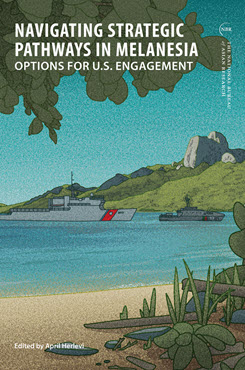Essay in NBR Special Report 110
Integrating Melanesia into the Indo-Pacific Security Architecture
Analysis for U.S. Policymakers
This essay analyzes past, present, and projected future security affairs in Melanesia, providing guidance for U.S. policymakers on how to better integrate the region into the broader Indo-Pacific security architecture.
EXECUTIVE SUMMARY
MAIN ARGUMENT
Integrating Melanesia—a region that comprises the Pacific Island countries of Fiji, Papua New Guinea, Solomon Islands, and Vanuatu—into the Indo-Pacific security framework is necessary for U.S. security interests given the region’s positioning along strategic maritime passageways and role in connecting the U.S. and its regional allies. Four pillars should serve as the basis for developing this partnership: (1) respect for the autonomy of all partners, (2) partnerships built on a common vision and shared values, (3) system compatibility, and (4) resilience to external shocks. This vision confronts two primary obstacles. The first is coercive foreign activity in the region, especially given how recent People’s Republic of China (PRC) activity in Melanesia has constrained regional autonomy and threatened democratic stability. The second is the use of “light switch diplomacy” by the United States and its regional allies, which has damaged relations with Melanesian countries. To address these concerns, the U.S. and its allies should prioritize building stronger and more comprehensive partnerships through investment in local communities, Pacific media, economic connectivity, and compatible information and communications technology systems.
POLICY IMPLICATIONS
- While the PRC’s activity in Melanesia is not inherently problematic and some of its involvement could bring meaningful change to Pacific communities, this activity is concerning because it constrains regional autonomy and threatens democratic stability.
- In recent years, the U.S. and its allies have treated engagement with Melanesia like a light switch, turning it on and off to fit immediate political needs. This approach and the failure to invest in long-term partnerships has damaged their relations with Melanesian countries.
- Focused, concrete, and consistent action addressing both short-term and long-term needs is necessary to heal relations and influence the direction of regional security.
Margaret S. Sparling is an Associate Research Analyst at the Center for Naval Analyses. She is a recent graduate from the University of Virginia’s Frank Batten School of Leadership and Public Policy, where she earned her Master of Public Policy degree. The views expressed in this essay are her own.


